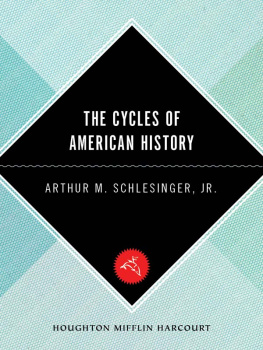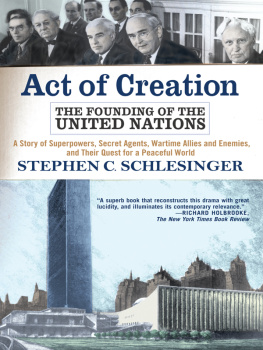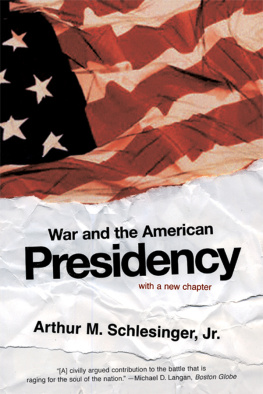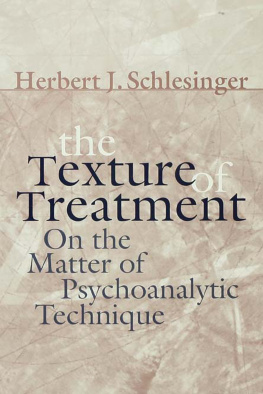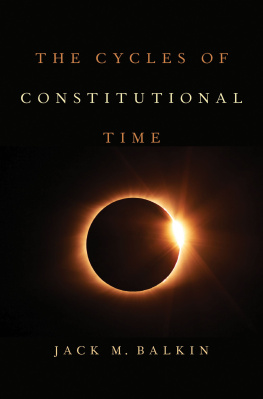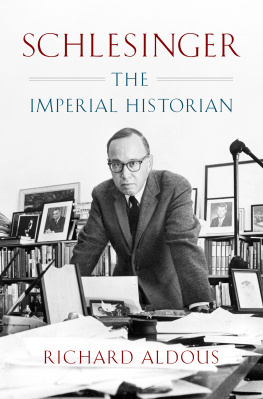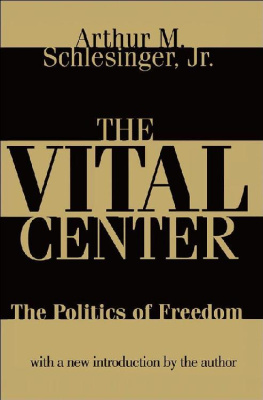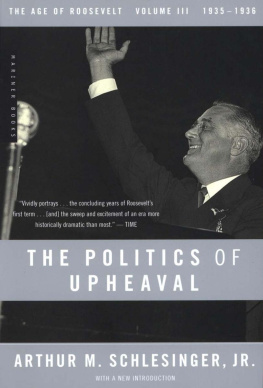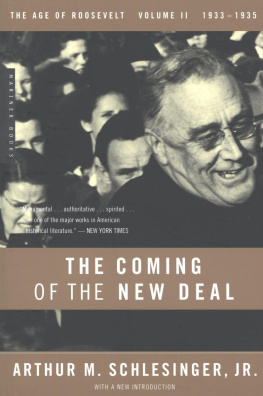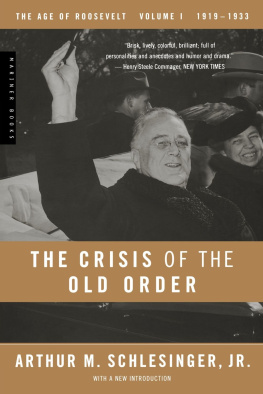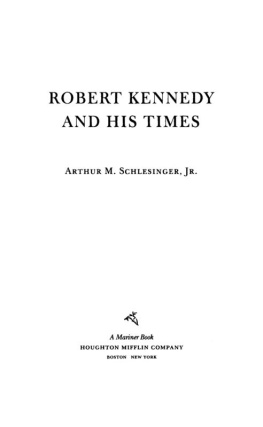For
AVERELL HARRIMAN
who has seen the cycles pass, and turn again
First Mariner Books edition 1999
Copyright 1986 by Arthur M. Schlesinger, Jr.
Foreword to the Mariner Edition copyright
1999 by Arthur M. Schlesinger, Jr.
ALL RIGHTS RESERVED
For information about permission to reproduce selections from this book, write to Permissions, Houghton Mifflin Harcourt Publishing Company, 215 Park Avenue South, New York, New York 10003.
www.hmhbooks.com
The Library of Congress has cataloged the print edition as follows:
Schlesinger, Arthur Meier, date.
The cycles of American history.
Bibliography: p.
Includes index.
1. United StatesForeign relationsPhilosophy. 2. United States-Politics and governmentPhilosophy. 3. Cycles I. Title.
E 183 7. S 373 1986 973 86-7706
ISBN 0-395-95793-1
e ISBN 978-0-547-52750-5
v1.1212
Foreword to the Mariner Edition
A LOT HAS HAPPENED to America and the world since The Cycles of American History first appeared in 1986. The Cold War is over. Communism, like fascism before it, is extinct. The specter of nuclear conflict blowing up the planet has receded. The ideological conflict that so savagely divided the world has been settled, for the time being anyway. Democracy has prevailed over totalitarianism, the market over the command economy.
But history rushes on. Pent-up religious, ethnic, racial, linguistic and tribal antagonisms, long repressed by the Cold War, now burst out of bitter memory to tear nations apart. And forces more potent than politics and war remold our lives. While leaders declaim and commentators second-guess, science and technology reconfigure the planet.
The Cycles of American History was perhaps one of the last books actually composed on that antediluvian instrument, the typewriter. This foreword is being written on that glorious invention, the word processor. The computer and the microchip constitute a permanent revolution. It is a revolution no one can stop. Henry Adamss law of acceleration hustles us on into the millennium.
Not for two centuries has the structure of society been in such flux. Two hundred years ago the farm-based economy was beginning to give way to the factory-based economythe time of upheaval we know as the Industrial Revolution. Today we are living through another age of profound structural transformationthe shift from a factory-based to a computer-based economy. Because the Computer Revolution is far more peremptory and far more compressed than the Industrial Revolution, it is far more traumatic. We are moving into a time of turbulence. It will be marked by drastic reprogramming of attitudes, ideas, institutions and minds.
What impact does this profound structural transformation have on the American political cycle? The cyclical hypothesis, which I inherited from more distinguished historians, Henry Adams and my father, finds a pattern of alternation in American history between negative and affirmative governmentthat is, between times when voters see private action as the best way of meeting our troubles and times in which voters call for a larger measure of public action.
In the twentieth century, this alternation has taken place at thirty-year intervals: on the public-activism side, for example, Theodore Roosevelt and the Progressive era in 1901, Franklin D. Roosevelt and the New Deal in 1933, John F. Kennedy and the New Frontier in 1961. There is no mystery about the periodicity. Thirty years is roughly the span of a generation, and the generational succession has been the mainspring of the cycle.
If the thirty-year rhythm held, the 1992 election was scheduled to bring about a swing toward affirmative government. That indeed appeared to take place with the victory of the children of KennedyBill Clinton and Al Gorejust as thirty years earlier the incoming Kennedy generation had been the children of Franklin Roosevelt, and thirty years before that the incoming FDR generation had been the children of Theodore Roosevelt and Woodrow Wilson.
What happened to the activist phase supposed to begin in 1993? By 1994 Newt Gingrich and his Contract with America seemed to foreshadow an epoch, not of progressivism, but of conservatism. Though the Contract soon evaporated and Gingrich himself eventually departed from politics, the 1990s have plainly not been the liberal era forecast by the cyclical hypothesis.
The cyclical rhythm operated within the framework laid down by the Industrial Revolution. The Computer Revolution is establishing a new framework with as yet unknown effects on the political process. The rhythm may in time be restored, but in the short run the new age is a scary voyage into uncharted waters. Even while the country prospers in the present, it is filled with foreboding about the future. This accounts for the otherwise inexplicable coexistence in America of relative contentment with pervasive anxiety. It accounts too for the prolongation of the conservative phase of the cycle.
Other factors have contributed to the derailing, or deferring, of cyclical change. The major previous interruption of the thirty-year rhythm followed the agonizingly divisive 1860s. The traumatic years of the Civil War, Reconstruction, presidential assassination and presidential impeachment left a drained nation eager for rest and recuperation. The 1960s were agonizingly divisive too. Popular disgust for the violence and acrimony of those unbridled times drained the nation once again and kept the Reagan counterreformation alive and well into the 1990s.
The end of the Cold War is another contributing factor. In days of crisis, power flows from Congress to the Presidency. When crisis subsides, Congress seeks to reclaim lost powers. Harsh reactions against executive aggrandizement take place. As the impeachment of Andrew Johnson followed the Civil War, so the impeachment of Bill Clinton followed the Cold War.
The Senate acquitted Johnson, but even the failed impeachment had serious consequences for the Presidency. A brilliant young political scientist at Johns Hopkins, Woodrow Wilson, concluded that Congress had now become the central and predominant power of the system and called his influential book of 1885 Congressional Government. Presidential leadership languished in the more than thirty years between Lincolns assassination in 1865 and the (accidental) accession of Theodore Roosevelt to the White House in 1901. Those years of a diminished Presidency led James Bryce to write the famous chapter in The American Commonwealth titled Why Great Men Are Not Chosen Presidents.
Has the Computer Revolution abrogated the political cycle? I doubt it, for problems have a way of imposing themselves on politics. The republic could afford an interlude of congressional government in the nineteenth century when the United States was a bit player on the world stage. But the very nature of the challenges facing American Presidents in the century ahead calls for strong executive leadership.
Today the United States is the worlds only superpower. It must take the lead in the search for remedies against war and terrorism and weapons of mass destruction, against poverty and disease. Nor is negative governmentderegulation, devolution and privatizationlikely to cure our troubles at home. From race relations and the reform of education to the extension of health care, the protection of the environment and the modernization of infrastructure, our problems call for public initiatives. The cycle, though derailed, is not necessarily dead.
If the Computer Revolution is so drastically transforming our world, what is the point of the reissue of a book published in 1986? This is really to ask: What is the point of history at all?
The past is not an irrelevance. We cannot escape history, said Lincoln. History is to the nation what memory is to the individual. As an individual deprived of memory becomes disoriented and lost, not knowing where he has been or where he is going, so a nation without an understanding of its past will be disabled in dealing with its present and its future. In times of change and danger, John Dos Passos wrote in
Next page
